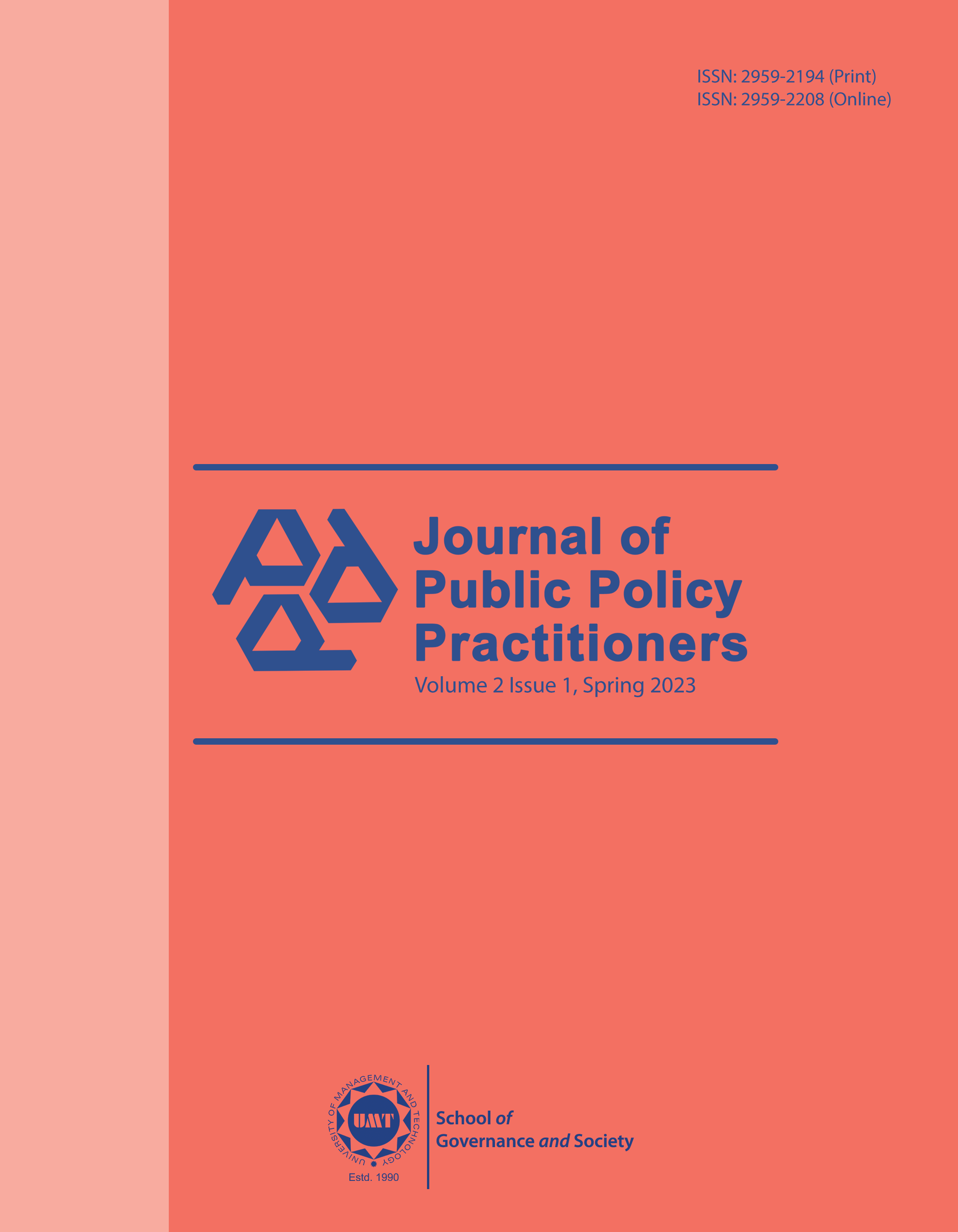Water Scarcity in Pakistan: Resource Constraint or Mismanagement
Abstract
 Abstract Views: 0
Abstract Views: 0
The current study has addressed major issues associated with water resources, gap analysis for the allocation, distribution mechanism, and recommendation for efficient utilization. This study specifically addresses the role of political factors in giving rise to water crisis in Pakistan, the factors hampering effective implementation of Indus Water Treaty, and the role of local politics in water crisis in Pakistan. Moreover, it is also focused on the discrimination of provinces in terms of water apportionment. The study also analyzes, whether effective implementation of the ‘National Water Policy 2018’ would lead to efficient water resource management. The conclusion and recommendations comprise a mixture of qualitative and quantitative analysis of events, situations, and numerical data from reliable sources. Resultantly, it was inferred that water availability is emerging as the definite challenge for individuals and communities across the globe. An urgent concerted effort is required to cope up with the exponential demand and its efficient utilization. However, the water production and supply management has not been developed in line with the critical increase in population growth, intensive water use for agrarian economy, and fast-growing industrialization. Developmental activities can only be sustained if natural resources are also preserved for the next generations and their depletion effect is addressed for longer terms. It is crucial to reformulate the current national water policy by consensus and implement it with its inbuilt regular updating process. Water securities must be prioritized by legislators, politicians, and policymakers. Politics over water security worsens the problems and more water injection in national grid is becoming highly linked with the national level politics.
Downloads
References
Ahmad, O. (2018, June 15). The Indus waters treaty: Caught between a dispute and a hard place. The Third Pole. https://www.thethirdpole.net/en/energy/indus-water-treaty-dispute/
Ahmed, A., Iftikhar, H., & Chaudhry, G. M. (2007). Water resources and conservation strategy of Pakistan. The Pakistan Development Review, 46(4), 997–1009. https://doi.org/10.30541/v46i4IIpp.997-1009
Ali, I. (2015). Undeclared water war on Pakistan: Tactical and strategic defence measures. Allied Book Company.
Arif, K. M. (2010). Estranged Neighbours: India, Pakistan, 1947-2010. Dost Publications.
Ashraf, M. (2018). Water scarcity in Pakistan issues and options. Hilal. https://pcrwr.gov.pk/wp-content/uploads/2021/07/Water-Scarcity-in-Pakistan-Issues-and-Options-May-18.pdf
Bakker, K., & Morinville, C. (2013). The governance dimensions of water security: A review. Philosophical Transactions of the Royal Society A, 371(2002). https://doi.org/10.1098/rsta.2013.0116
Cincotta, R. P., Engelman, R., & Anastasion, D. (2003). The security demographic: Population and civil conflict after the Cold War. Defense Technical Information Center. https://apps.dtic.mil/sti/citations/ADA422694
Frenken, K. (2012). Irrigation in southern and eastern Asia in figures: AQUASTAT survey-2011 (Water Reports No. 37). Food and Agriculture Organization of the United Nations (FAO). https://www.cabdirect.org/cabdirect/abstract/20123323059
Ghazanfar, M. (2008). Kalabagh Dam and the water debate in Pakistan. Lahore Journal of Policy Studies, 2(1), 153–180.
Government of Pakistan. (2012). National climate change policy. https://mocc.gov.pk/SiteImage/Policy/NCCP%20Report.pdf
Government of Pakistan. (2016). Water and irrigation (Technical Paper No. 8). https://pbit.punjab.gov.pk/system/files/8.%20Water.pdf
Hashmi, F. K., Rashid, M., Razzaq, A., & Hussain, A. (n. d.). Integrated water resource management (IWRM) & its impact on agriculture in Pakistan. Zarai Taraqiati Bank Limited. https://www.ztbl.com.pk/wp-content/uploads/Documents/Publications/Research-Studies/IntgrWaterResMgt.pdf
Hassan, M. (2016). Water security in Pakistan: Issues and challenges. Development Advocate Pakistan, 3(4), 1–34.
Hussain, Z. (2014). Water resources in Indus Basin. Al-Faisal Publisher
Kahlown, M. A., & Majeed, A. (2002). Water resources situation in Pakistan: Challenges and future strategies. Science Vision, 7(3/4), 46–49.
Khalid, I., & Begum, I. (2020). Hydro politics in Pakistan: Perceptions and misperceptions. South Asian Studies, 28(1), 7–23.
Khoso, S., Wagan, F. H., Tunio, A. H., & Ansari, A. A. (2015). An overview on emerging water scarcity in Pakistan, its causes, impacts and remedial measures. Journal of Applied Engineering Science, 13(1), 35–44. https://doi.org/10.5937/jaes13-6445
Mustafa, D., Akhter, M., & Nasrallah, N. (2013). Understanding Pakistan's water-security nexus. United States Institute of Peace. https://www.usip.org/sites/default/files/PW88_Understanding-Pakistan's-Water-Security-Nexus.pdf
Mustafa, K. (2019, August 20). Deviation by India from Indus waters treaty worrisome: Vawda. The News International. https://www.thenews.com.pk/print/514579-deviation-by-india-from-indus-waters-treaty-worrisome-vawda
Nabi, S., & Batool, S. S. (2022, October 7). India’s dams and Pakistan’s water crisis. The Diplomat. https://thediplomat.com/2022/10/indias-dams-and-pakistans-water-crisis/
Petruzzello, M. (2023, April 19). Water scarcity. Encyclopedia Britannica. https://www.britannica.com/topic/water-scarcity
Qureshi, A. S. (2011). Water management in the Indus basin in Pakistan: Challenges and opportunities. Mountain Research and Development, 31(3), 252–260. https://doi.org/10.1659/MRD-JOURNAL-D-11-00019.1
Qureshi, R., & Ashraf, M. (2019). Water security issues of agriculture in Pakistan. Pakistan Academy of Science. https://www.paspk.org/wp-content/uploads/2019/06/PAS-Water-Security-Issues.pdf
Sherani, S. (2019). Institutional reforms in Pakistan: Missing piece of the development puzzle. In S. S. Aneel, U. T. Haroon, I. Niazi (Eds.), 70 years of development: The way forward (pp. 39–61). Sang-e-Meel Publishers. https://www.sdpi.org/sdpiweb/publications/files/Seventy-Years-of-Development-The-Way-Forward.pdf
Siddiqui, I. H. (2010). Hydro Politics & Water Wars in South Asia. Vanguard Books.
The Water Sector Task Force of the Friends of Democratic Pakistan. (2012). A productive and water-secure Pakistan. https://mowr.gov.pk/SiteImage/Misc/files/FoDP-WSTF-Report-Final-09-29-12.pdf
The World Bank. (1960). Indus water treaty. World Affairs, 123(4), 99–101. http://www.jstor.org/stable/20669916
United Nations Development Program. (2016). The vulnerability of Pakistan’s water sector to the impacts of climate change: Identification of gaps and recommendation for action. https://www.undp.org/pakistan/publications/vulnerability-pakistan%E2%80%99s-water-sector-impacts-climate-change-identification-gaps-and-recommendations-action
United Nations Water. (n. d.). Water Scarcity. https://www.unwater.org/water-facts/water-scarcity
Copyright (c) 2023 Iffat Farooq

This work is licensed under a Creative Commons Attribution 4.0 International License.







